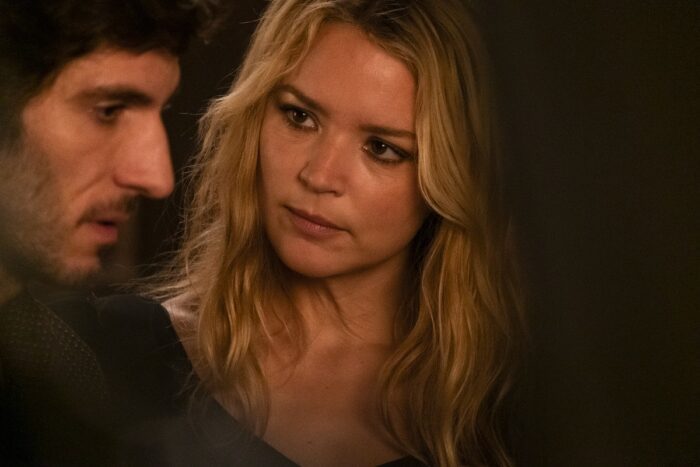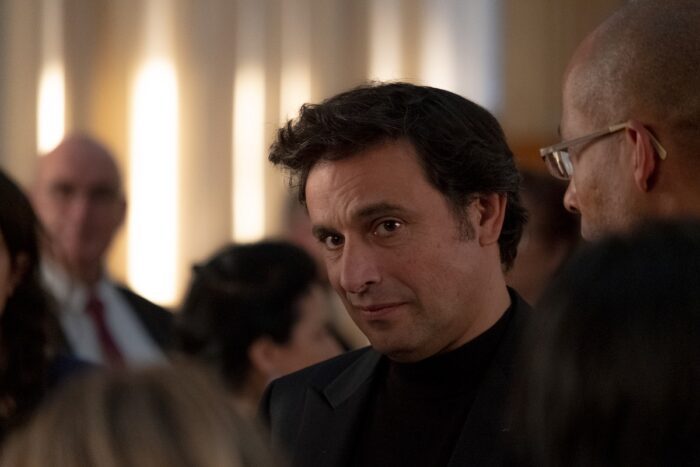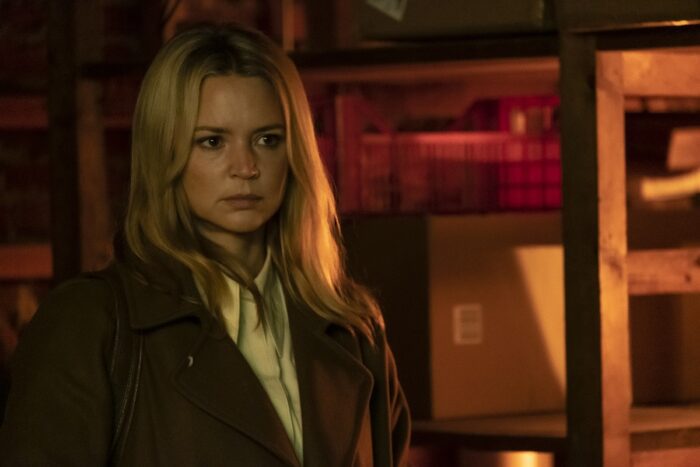What’s in a name? It might be just the letters that form given and family names that appear on our ID cards and tax forms. Or it might be the most singular iteration of our self. It takes a loooooong time for the French drama Madeleine Collins, directed and co-written by Antoine Barraud, to reveal just who that titular person is. In fact, by the time “Madeleine Collins” is named, just a few minutes from the film’s conclusion, you might have forgotten it was the title of the film you’ve been watching. When it does come, though, it’s a satisfying denouement to the frequently mysterious and occasionally mystifying events that precede it. Despite a few small missteps, Madeleine Collins makes for a knotty, thorny thriller in the tradition of maternal and psychological melodrama, anchored by a marvelous lead performance from the ever-charismatic Virginie Efira.
Madeleine Collins begins with something of a prologue. Whether it takes place before, during, or after the events of the main plot we’re not to know. A young woman shops for a nightgown in a tiny French boutique but faints on the stairs when she exits and dies. We don’t learn her name or identity. What we do know is that we are in the grip of a mystery and in the hands of some excellent filmmakers, given the rich cinematography and measured pace of the scene. For its duration the plot then fixes on a woman named Judith (played by the immeasurably talented, mesmerizing Efira, equally excellent in the recent Revoir Paris), who lives, it appears, a double life, split between households in two separate countries.

In Switzerland, where Judith is known as Margot, she works as a professional translator and lives in a middle-class flat with Abdel (Quim Gutierrez) and Ninon (Loïse Benguerel), the sweet little girl they are raising together. But every few days she leaves them, citing work obligations, for her life across the border. In France, where she goes by Judith, life is glamorous: her husband Melvil (Bruno Salomone) is an accomplished orchestra conductor on the cusp of a major career breakthrough. The couple have two school-age boys, the older of them, Joris (Thomas Gioria), beginning to harbor some suspicion and resentment towards his mother’s constant disappearances and secretive phone calls.

Judith’s is a precarious balance, one based on such a complex set of lies and tightly scheduled disappearances, that keeping her two lives separate seems an impossibility. And, of course, film narrative demands (since the days of Edwin Porter) that the two threads converge. Judith is not the only member of the two connected families in on the secret, nor is her duplicity unrelated to the mysterious death in the film’s prologue. What for a time was a functioning, if dysfunctional, familial arrangement slowly begins to unravel, as does Judith’s mental state. As a tightly bound, tautly wound fiction begins to fray, Madeleine Collins treads in new territory, the psychological thrillers and maternal melodramas of Max Ophüls, Stephan Zweig, and Alfred Hitchcock.

The script (co-written by Héléna Klotz) plays a little fast and loose with narrative information, beginning with its seemingly unrelated and intentionally mysterious prologue, and continuing with key revelations about characters’ knowledge being parceled out in kibble-size bits along the way. Key facts are withheld for long stretches: doing so keeps viewers guessing but seems unnecessarily manipulative. It’s hard, watching Madeleine Collins, not to wonder how the film would work if it weren’t so committed to mystery and secrecy.
With Virginie Efira onscreen for nearly every second of the film, though, I’m probably churlish to complain. Efira is, obviously, beautiful and magnetic, playing a woman others are drawn to, almost helpless to refuse, even when common sense suggests they should. This role gives Efira chances to play elegant society wife, competent career professional, caring-if-troubled mother, and an independent woman with a secretive streak—not to mention a fraught, disturbed, perhaps even psychopathic criminal on the run. Were it not for her excellent performance I am not sure Madeleine Collins would make much sense at all.

Fortunately for all of us, Madeleine Collins has Efira to thank for a spellbinding performance in a knotty melodrama worthy of the kind of torture Sirk and Zweig used to put Jane Wyman and Joan Fontaine through. In other words, it works. There’s plenty of fun trying to guess just what motivates the complex deceptions Judith and others have agreed to, and there’s no shortage of pleasure in Efira’s performance. Madeleine Collins‘ script may play fast and loose with the facts of the matter, but with Efira in the lead, excellent supporting turns from the cast (including Jacqueline Bisset as Judith’s mother), elegant cinematography (from Gordon Spooner) and production design (Katia Wyzszkop), and taut editing (Anita Roth), the film makes for a compelling psychodrama well worth one’s time.
Directed and co-written by Antoine Barraud and starring Virginie Efira, Madeleine Collins opens Friday, August 18, 2023 in New York City and Los Angeles, followed by national release on Prime Video and Apple TV August 29. In French with English subtitles.



